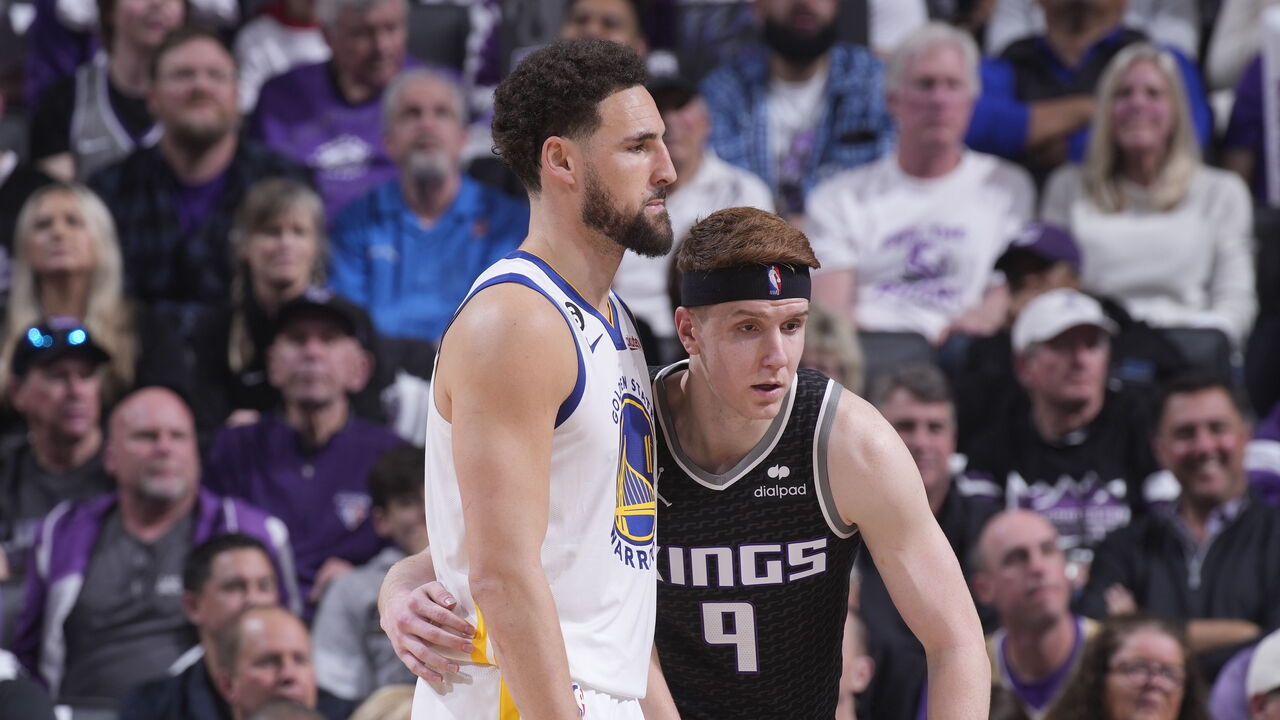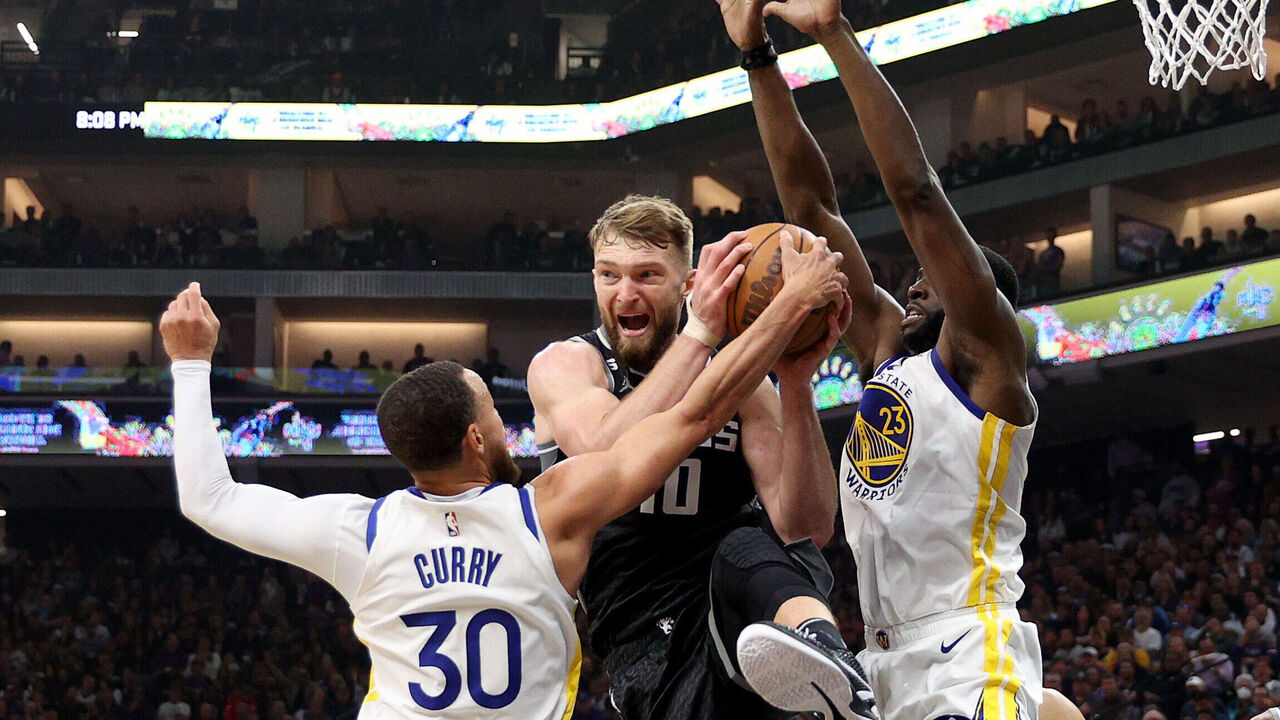Could Warriors-Kings be a passing of the torch?
On top of all its on-court drama, electric atmosphere, and aesthetic splendor, the first-round series between the Sacramento Kings and Golden State Warriors is rife with poetic symmetry.
Sacramento is in a place not so different from where Golden State was a decade ago: A long-destitute Northern California franchise finally emerging from a dusty cocoon in a flashy new form, its passionate fanbase reignited after years of dormancy.
No one really saw the Warriors coming back in 2013 (heck, Steph Curry wasn't even an All-Star that year), and their breakout didn't feel entirely real until they upset the 57-win Denver Nuggets in the first round and pushed the eventual West champion Spurs to six games in the conference semis. Ten years later, the Kings have a similar sense of validation and legitimacy in their sights, having put the defending champs in their first 2-0 series hole of the Curry era before Golden State took Game 3 in the Bay on Thursday night.
If this year's Kings are spiritually akin to the early-Curry Warriors teams that were just starting to peek through, they're far more stylistically akin to the version that fully blossomed after Steve Kerr arrived and Draymond Green emerged as a foundational piece. Obviously, the similarities aren't apples to apples - nothing is when it comes to the Warriors or their dynastic core of Curry, Green, and Klay Thompson.
Sacramento's defense, for as admirably as it's performed in this series, isn't and never will be close to reaching the heights Golden State's did. The Kings aren't a dynasty or even a perennial contender in the making. (Probably.) But that doesn't mean the teams don't share plenty of traits and basketball DNA. The Warriors have spawned plenty of imitators, but none who've embodied their ethos and energy quite like these Kings.
Mike Brown was part of Kerr's coaching staff from 2016-22, after all, and upon taking over in Sacramento, he set about molding the Kings' offense in the image of Golden State's. It's an offense built on organized randomness, its motion principles executed with relentlessly practiced synchronicity, with every action on one side of the floor producing an equal reaction on the other. The Kings, like the Warriors, run all manner of dribble-handoffs and split action around a high-post playmaking hub and use the gravity of their shooters to open up backdoor cuts and slips to the basket. Sacramento rode that formula to the highest offensive rating in NBA history this season.

The Kings use Kevin Huerter as a Thompson facsimile, slingshotting him into threes off pindowns and dribble handoffs. Domantas Sabonis is their Draymond-like fulcrum who frees everyone up with his screens and connects both sides of the floor with his playmaking, either as a short-roller or an elbow operator orbited by cutters and movement shooters. Malik Monk brings the same conscience-less gunning and downhill explosiveness Jordan Poole does off the bench. Harrison Barnes, who once filled gaps on the wing in Golden State, now does so in Sacramento.
And both offenses are driven by dynamic point guards who bend defenses in their own distinct ways - Curry with game-breaking shooting, Fox with game-breaking speed. Again, this isn't comparing Fox to Curry, for whom there's absolutely no comparison. It's just to say that Fox's outlier skill also creates the conditions for his team's unique offense to thrive. Because more than anything, the Kings' offense is predicated on pace.
They've stretched that old Golden State philosophy to what feels like its logical conclusion, to the point that even the Warriors have looked shell-shocked by it at times. Golden State didn't help its cause in Games 1 and 2 by continually throwing the ball away and conceding easy open-court opportunities, but Sacramento has been just as content to run off of Warriors misses; the Kings have turned 43.4% of their defensive rebounds into transition possessions this series, up from their league-leading regular-season rate of 35.1%, per Cleaning the Glass.
They're running off makes, too. There were multiple moments in those first two games in Sacramento when the Warriors hit what appeared to be momentum-swinging shots, only for the Kings to pull the ball out of the basket and race down the floor for a score of their own before Golden State had a chance to exhale. The Kings' average time-to-shot in the series clocks in at 10.1 seconds overall and 13.2 seconds following a Warriors made basket, per Inpredictable. That doesn't just lead the league this postseason; if it holds, it will make them the fastest playoff team in recorded history.
That's particularly important because Golden State has actually done a masterful job of bottling up Sacramento's potent offense in the half court. Through three games, the Kings have scored just 90.9 points per 100 first-shot half-court possessions, compared to 97.2 for the Warriors.
While we tend to think of Golden State as a switchy defensive team and of switching as the best way to neutralize Sacrmento's most dangerous offensive actions (namely the deadly dribble-handoff game), the Warriors have actually done very little switching at the point of the exchange. They've done some peel switching and next-ing behind the play, as well as some one-through-four switching to negate off-ball actions. But mostly, they've been focused on staying connected to their original assignments via dogged screen navigation.
That's allowed Kevon Looney to hang way back and challenge Sabonis to come to him. It's forced Sabonis to try and be more of a scorer than a facilitator from the elbow, either with mid-range jumpers or post isos or drives that the Warriors collapse on late. Even when Green's played the five, Golden State has preferred to have him lay back rather than switch out onto Sacramento's guards. The result is that Sabonis, who averaged 19.1 points and 7.3 assists on 66.8% true shooting during the regular season, is averaging 17 points on 50.1% true shooting with more turnovers (4.3) than assists (3.3) in the series. It helps that Huerter, the recipient of so many of those DHOs, has seemingly forgotten how to shoot.

The Kings' own defense has been shockingly good, given the way it struggled (25th in points allowed per possession) in the regular season. With Sabonis coming out to meet Curry at the level of the screen, even as far out as midcourt, the team has collectively had to cover a ton of ground with countless back-line rotations, and it's done so with aplomb. Barnes has been outstanding as a low man. Fox and Davion Mitchell have done yeoman's work pursuing Curry over screens and denying him the ball with top-locks. And contrary to the Warriors' tactics, the Kings have also opted to crowd Green's airspace when he orchestrates high-post sets, forcing him into bushels of turnovers in the process.
It's been a fun chess match, and it feels like it's just getting started. The Kings have largely met the moment, playing fearless basketball in the face of some Warriors mini-runs that we've seen snowball into full-blown avalanches and overwhelm inexperienced teams in the past. In their two wins, the Kings were able to stem the tide thanks to timely shot-making from Fox (icy and unflappable in his first playoff appearance), Monk's slippery isolation scoring, clutch offensive rebounding from Sabonis and Barnes, that unexpectedly locked-in defense, and their relentless pace.
But the Warriors are going to make them earn it. They showed as much with that resounding Game 3 win when they cleaned up their turnovers, turned the tables on Sacramento on the offensive glass, got monster performances from Curry and Looney, and smothered the Kings' offense even with Green suspended and Gary Payton II out with an illness.
This has started to feel like a last stand of sorts for Golden State, with the dynasty teetering on the brink. Curry remains transcendent, but he just turned 35. Thompson is 33 and showing major slippage, especially defensively. The bridge to the future feels rickety, given Poole's stymied progress and the complete erasure of James Wiseman from the picture. Hovering over it all is the fact that Green can opt out and become an unrestricted free agent this summer.
The Warriors aren't the Warriors without Green, but their appetite for keeping him around could nevertheless be soured by his continually damaging lack of impulse control, his waning offensive utility, or the harsher tax penalties that are reportedly coming in the new CBA. It's unclear who'll even be making that decision since longtime GM Bob Myers is also in the last year of his contract.
The Warriors are just trying to stave off all that uncertainty for a little while longer. Whether or not this proves to be their last gasp, and whether or not it proves to be the start of something bigger for the Kings, this feels like a series and a moment we'll remember for a long time: The defending champs on the mat, pinned down by the hungry upstart they helped inspire - the team that feels, in so many ways, like their spiritual successor.
Bring on Game 4.